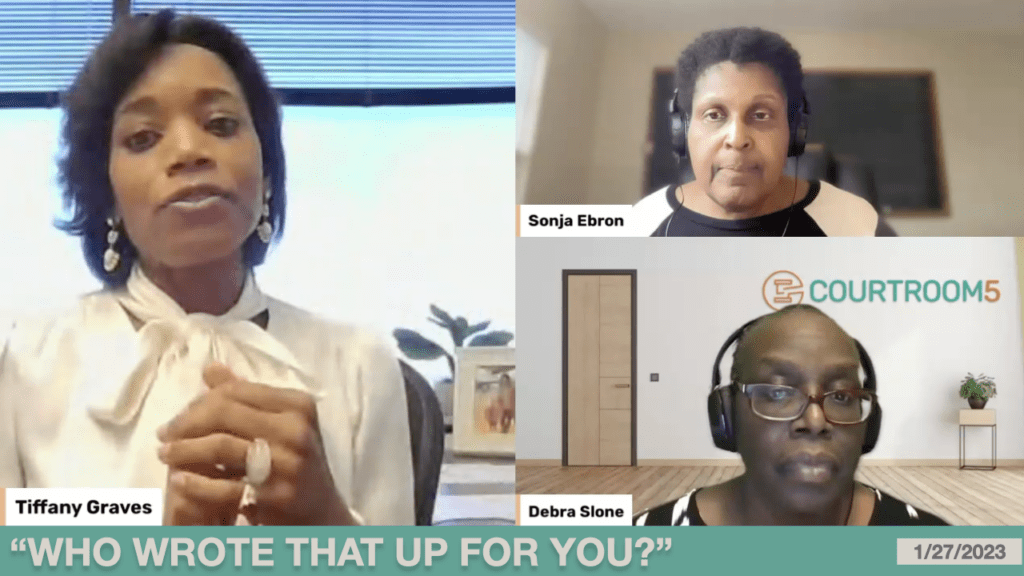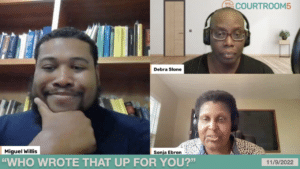Tiffany Graves is the first pro bono counsel at Bradley Arant Boult Cummings, LLP, the largest law firm in the southeast U.S., with over 600 attorneys serving the banking, construction, energy, and healthcare industries. (“Pro bono” means “for the good” or free of charge.) Each attorney at the firm provides a minimum of 50 hours of free legal services annually to people who cannot afford an attorney. Tiffany’s role is to ensure opportunities for pro bono service are available when an attorney at the firm is ready to serve.
Tiffany’s legal career has been devoted to closing the justice gap between those who can pay for representation and those who cannot. She is a former director of the Mississippi Access to Justice Commission. Prior to that, she ran the Mississippi Volunteer Lawyers Project. Tiffany shared the importance of pro bono service for both the legal profession and the larger society. She also advised that people needing free legal services should contact their local legal aid office for a referral to firms like Bradley.
– Connect on LinkedIn
– Connect on Twitter
– Visit the website
Hear the full episode
Watch the full episode
For more on the need to fix U.S. courts, subscribe to “Who Wrote That Up For You?” wherever you listen to podcasts.
Tiffany Graves Answers 3 Questions On Justice
Here’s a blast from the past, an early (2016) interview with Tiffany when she ran the Mississippi A2J Commission:
Among the Lawyers We Love is Tiffany Graves, executive director of the Mississippi Access to Justice Commission. Mississippi has 700,000 people living below poverty level, and there’s only one legal aid lawyer for every 20,000 of them. Those lawyers work for the 15 legal services organizations operating in the state.
Funded by the Mississippi Supreme Court and the state bar, the Commission coordinates these organizations to improve their reach and efficiency, and represents them to the broader legal community in Mississippi. Crucial work, especially in these tough economic times. So I had a few questions for Tiffany on the topic of justice.
#1: What does justice mean?
Tiffany Graves: Justice means fair, impartial and even-handed – the way we should all desire the judicial system to be. Regardless of who ultimately prevails in a legal dispute, the system has worked in a just way if everyone feels like they had an opportunity to be heard before an impartial tribunal that ultimately renders a decision based on reason and neutrality.
#2: What is access to justice?
Tiffany Graves: Access to justice means that everyone – regardless of income or privilege – has an opportunity to be heard in the judicial system. Far too often, those with limited resources feel closed off from the judicial system because they do not know their rights and cannot afford attorneys. My work involves ensuring access to civil justice through civil legal aid. While those involved in the criminal justice system are guaranteed representation, individuals with civil issues, like family, housing and consumer issues, are not. Not having an attorney can make many feel like they do not have a voice in the legal system. We are working to change that by expanding our network of the pro bono attorneys and increasing the support we currently provide to those who have no other option but to represent themselves in court.
#3: What is the impact on society when everyone has access to justice?
Tiffany Graves: When everyone has access to justice, we can be assured that the very principle our founding fathers envisioned remains alive: justice for all, not just those who can afford it. My work with the Mississippi Access to Justice Commission is about expanding access to civil legal services to low-income people who, more than any other group, feel overlooked and ignored in the legal system. Access to justice professionals have to remain focused on ensuring that the doors to courtrooms across the country are open to all, including the growing number of self-represented litigants who often face an unfriendly judicial system.
Yes, indeed. Despite the challenges self-represented litigants face in court, it’s good to remember that we have friends in the legal profession. Tiffany Graves is one of them. Follow the Commission’s work on Twitter @MississippiATJ. Thank you, Tiffany!



